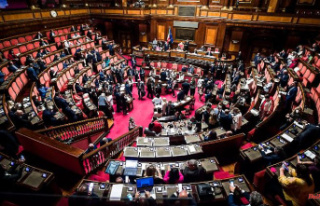Friedrich Merz calls on the parties to be more optimistic: the task of politics is to provide solutions, the CDU leader also appeals to his own ranks. Together with CSU regional group leader Dobrindt, he also criticizes the citizen money plans and "slow work" of the traffic light government.
Despite Corona and the Ukraine war, CDU leader Friedrich Merz would also like to see more confidence and optimism from the Union in everyday political life. "We unanimously assess the situation as critical, but solvable. We share the view that it makes no sense to cover the country with terrible news every year about how terrible everything is going to be with Corona and oil and gas and coal," he said at the end of the summer retreat of the CSU members of the Bundestag in Kloster Banz.
At the event, Merz and the CSU also criticized the federal government's plans to introduce citizen income and plans for more economical use of energy sources. Within the CSU state group, Merz's note was interpreted as a "reminder of the Union's political responsibility," according to participants. In the crisis, the Union must be perceived as a problem solver. However, it had also become clear that the main addressee was the federal government.
Some MPs also interpreted Merz's note as a pointer to CSU boss Markus Söder, who had repeatedly expressed himself very critically about the current situation in the past few days and spoke of an impending "gas triage". He was alluding to the fact that in the event of a gas shortage, individual companies or regions may be the first to be out of supply. Germany is strong enough to solve the problems, stressed Merz. "We have to analyze them properly. We then have to put the proposed solutions side by side and evaluate them and then come to decisions."
Merz accused the federal government of a lack of strategic action. "In particular, two key representatives of this federal government, the Federal Minister of Economics Robert Habeck and the Federal Minister of Health Karl Lauterbach, outdo each other every day with reports of how terrible all this can become." Politics must consist of explaining to people how you see a situation, pointing out possible solutions and then going through with them - at least the one you think is the right one. "I addressed it so clearly because I want the Union, CDU and CSU, to stand by what they have always said since the beginning of this Ukraine war," said Merz.
In this context, Merz and CSU regional group leader Alexander Dobrindt accused the federal government of working too slowly on the energy-saving plans. "We've had this war for more than five months now. And now they're slowly coming up with suggestions on how to solve a gas emergency or shortage," said Merz. The Union will now look at the proposals in detail. This also includes the assessment of whether the energy scenarios set up are the right ones. Dobrindt emphasized that it is currently not even certain whether the proposals by Federal Minister of Economics Robert Habeck have any chance of being implemented in the red-green-yellow coalition.
Habeck had previously announced another energy security package in Berlin. These include stricter requirements for filling gas storage facilities and activation of the lignite reserve. Despite the restart of the Nord Stream 1 gas pipeline on Thursday, Dobrindt sees Germany "still in complete energy insecurity." The current level of Russian gas supplies is not enough to avoid a gas shortage in the winter, Dobrindt said. "There is still a lot of homework to be done by the federal government," he said. The blackmail by the Russian head of state Vladimir Putin continues. "Other delivery capacities would be possible - they are deliberately not taken," said Dobrindt.
Slovakian Prime Minister Eduard Heger, who came especially to attend the retreat, warned his European partners not to be less willing to help Ukraine: "We in Europe cannot afford to tire of helping Ukraine," he said. Ukraine is important for the entire European region and it is in the national interest of European states and in Europe's interest to help Ukraine. In this context, Dobrindt advocated EU partnerships below full membership for countries such as Ukraine and Moldova and accused the Federal Republic of supplying arms too slowly and insufficiently.












